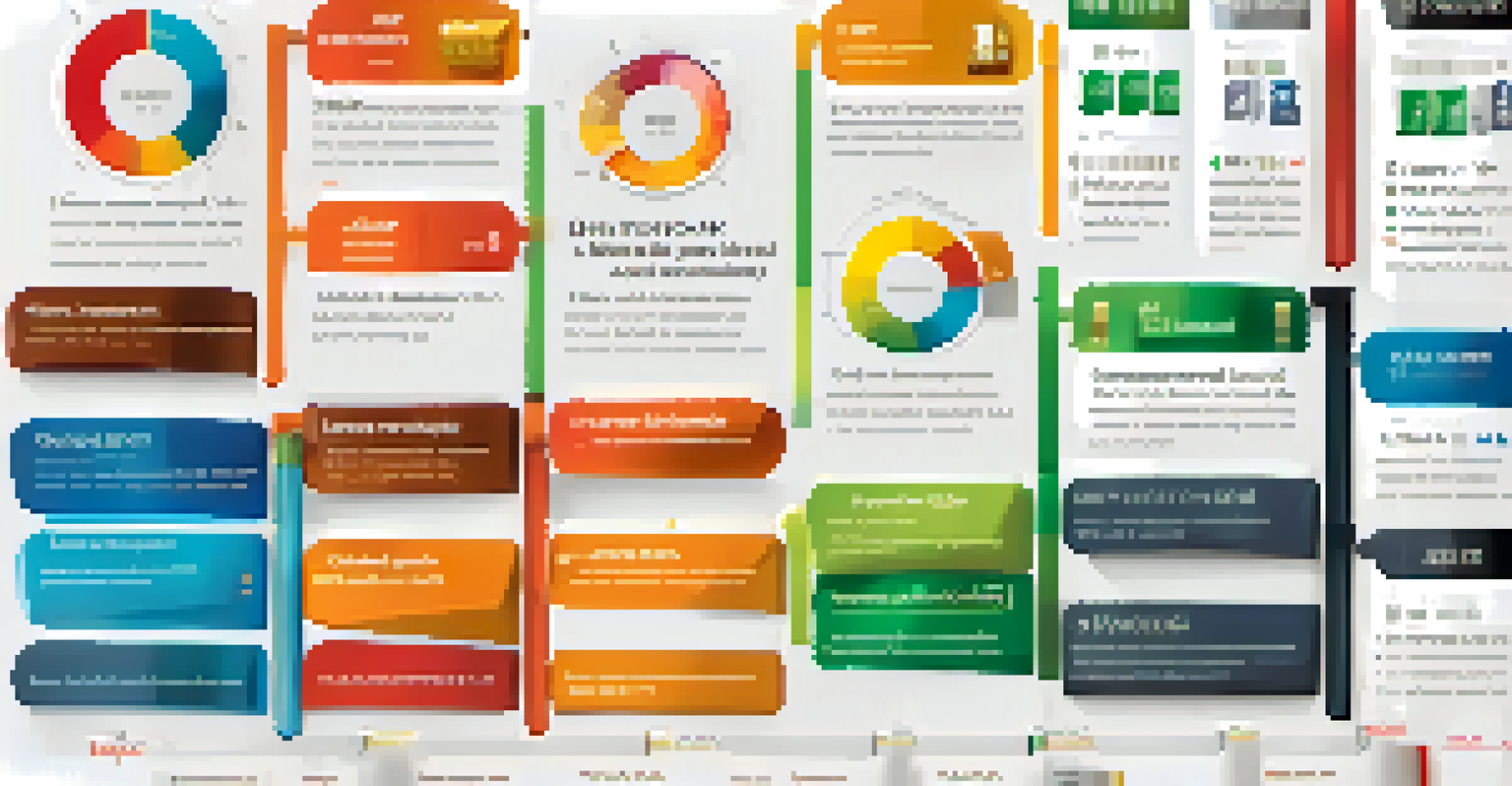Comparing Financial Products: Making Informed Choices

Understanding the Different Types of Financial Products
Financial products come in various forms, including loans, credit cards, and investment accounts. Each product serves a unique purpose, which can make it challenging to determine the right fit for your needs. For instance, while a personal loan can help with immediate expenses, a credit card might be better suited for managing ongoing purchases.
An investment in knowledge pays the best interest.
It's crucial to understand what each product offers, as well as its potential risks and rewards. For example, investment accounts might provide long-term growth potential but also come with market risks. Recognizing these distinctions can help you navigate the financial landscape more effectively.
In essence, knowing the types of financial products available is the first step toward making informed choices. By familiarizing yourself with the options, you'll be better equipped to decide what aligns with your financial goals.
Evaluating Interest Rates: A Key Factor in Your Decision
Interest rates play a pivotal role in determining the cost of financial products. Whether you're considering a mortgage or a savings account, the rate can significantly impact your financial situation. A lower interest rate on a loan means you'll pay less over time, while a higher rate on a savings account can boost your earnings.

When comparing financial products, it's essential to look beyond just the headline rate. Some lenders may offer attractive rates but come with hidden fees that can add up quickly. Always read the fine print and calculate the total cost over the life of the product.
Understanding Financial Products
Familiarizing yourself with different financial products helps you make informed choices that align with your financial goals.
Ultimately, understanding interest rates can empower you to make smarter financial choices. By evaluating how rates affect your potential returns or costs, you can select products that truly benefit your financial health.
Understanding Fees: Hidden Costs to Consider
Fees can often be the sneaky villains in financial products, lurking in the shadows and impacting your overall costs. From monthly maintenance fees on bank accounts to origination fees on loans, these charges can add up and eat into your budget. It's vital to identify these fees upfront to avoid surprises down the line.
It’s not what you look at that matters, it’s what you see.
For instance, a credit card may have a low interest rate but come with an annual fee that could negate your savings. By comparing different products, you can find those that offer the best value for your money. Always ask yourself, 'What fees will I incur, and how will they affect my finances?'
Being aware of fees helps you make informed choices that align with your financial goals. This way, you can avoid unnecessary costs and ensure you're getting the best deal possible.
Assessing Risk vs. Reward in Financial Products
Every financial product comes with its own set of risks and rewards. Understanding this balance is crucial in making informed decisions. For instance, investing in stocks may offer high returns but also carries the risk of losing your principal investment.
Conversely, a high-yield savings account provides lower returns with minimal risk, making it a safer option. When comparing products, consider your risk tolerance and how much you're willing to potentially lose versus gain.
Evaluating Interest Rates
Interest rates significantly influence the cost of financial products, making it essential to understand their impact on your overall financial health.
In the end, assessing risk versus reward helps you choose products that align with your financial comfort zone. This tailored approach can lead to more satisfying results and a stronger financial future.
The Importance of Terms and Conditions in Financial Products
Terms and conditions are the fine print that can dictate your experience with a financial product. They outline important details like payment schedules, penalties for late payments, and how interest is calculated. Ignoring these can lead to misunderstandings and unexpected costs.
For example, some loans may have prepayment penalties, which can discourage early repayment. By carefully reviewing the terms, you can avoid potential pitfalls and ensure you're fully informed about what you're signing up for.
Understanding the terms and conditions is a critical step in making educated choices. This knowledge equips you to navigate your financial products with confidence and clarity.
Comparing Financial Products: Tools and Resources
In today's digital age, comparing financial products has never been easier thanks to various tools and resources. Websites that aggregate financial products allow you to filter options based on your specific needs, be it low interest rates, minimal fees, or high rewards. These platforms can save you time and help you make more straightforward comparisons.
Additionally, reading customer reviews can provide valuable insights into the experiences of others. Hearing about real-life experiences can help you gauge the reliability and service quality of financial institutions.
Recognizing Hidden Fees
Being aware of fees associated with financial products allows you to avoid unexpected costs and find the best value for your money.
Leveraging these tools and resources can empower you to make informed choices that suit your financial situation. With the right information at your fingertips, you're more likely to find the perfect product for your needs.
Seeking Professional Advice: When to Consult an Expert
While doing your own research is essential, there are times when seeking professional advice can be beneficial. If you're feeling overwhelmed by your options or unsure about your financial goals, a financial advisor can provide tailored guidance. They can help you navigate complex products and develop a strategy that aligns with your objectives.
Moreover, professionals can offer insights you may not have considered, such as tax implications or investment diversification. Their expertise can lead you to better decisions and help you avoid common pitfalls.

Ultimately, knowing when to consult an expert can enhance your decision-making process. With the right guidance, you can take confident steps toward achieving your financial goals.
Final Thoughts: Empowering Yourself to Make Informed Choices
Comparing financial products may seem daunting, but it’s an empowering process when approached methodically. By understanding the various products, evaluating interest rates, and being aware of fees, you can confidently navigate your options. Remember, the goal is to find what best suits your financial needs and aspirations.
As you embark on this journey, keep in mind the importance of assessing risk versus reward and thoroughly reviewing terms and conditions. Each decision you make can significantly impact your financial future, so take the time to make informed choices.
In conclusion, arming yourself with knowledge and utilizing available resources will lead to better financial outcomes. With these tools, you're well on your way to making choices that enhance your financial health and overall well-being.